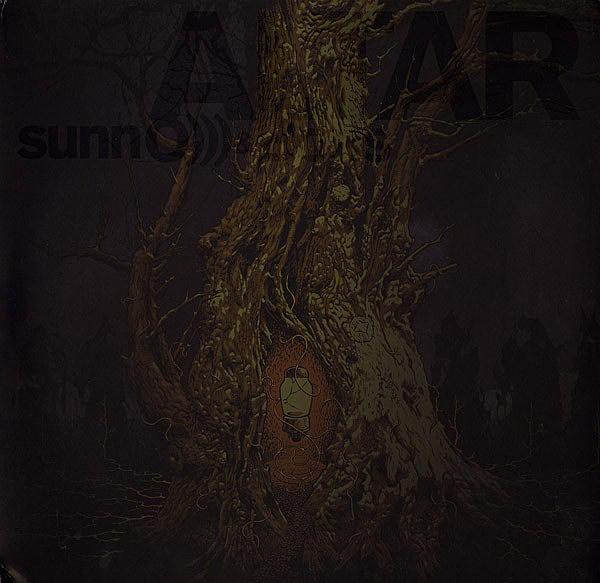
So Grim So True So Real: Boris

…
It takes a certain kind of fortitude to be a fan of Japanese experimental metal trio Boris. Over the course of the last twenty-five years, the band has released twenty-two full-lengths, another fifteen or so collaborative projects, and more splits, EPs, and live albums than even the most devoted of fans could possibly keep track of, not all of which have seen official release in the US. For example, 2013’s Präparat, easily their best album this decade, was only released on vinyl in Japan in such limited quantities that many American fans of the band might not even know that it exists.
It’s not simply their prolific nature that provides the challenge. Over the course of their discography, they’ve gone from a heavily Melvins—they took their name from a song on Bullhead, allegedly because of their appreciation of one of Dale Crover’s drum fills—and Earth-inspired sludge/drone band to incorporate elements of doom, stoner rock, harsh noise, shoegaze, hardcore punk, psychedelic and even dream pop. They also do strange things like the controversial Vein, where they simultaneously released two different but identically packaged versions of the album, one hardcore punk and one drone/noise. As a result, their output has been both thrillingly varied and frustratingly inconsistent.
Given the overwhelming size and erratic nature of their discography, it can be difficult for newcomers to find the best entry point into the very strange and often brilliant world of guitarist/vocalist Wata, guitarist/bassist/vocalist Takeshi, and drummer/vocalist Atsuo. With their twenty-third full-length Dear scheduled to drop on July 14, this seems like the perfect time to give Boris the So Grim, So True, So Real treatment.
…

…
So Grim – Attention Please (2011)
After three years of relative inactivity following the release of 2008’s sprawling, unfocused Smile, Boris made the leap from Southern Lord to Sargent House and made up for lost time by quickly releasing three new full-lengths: the experimental electro-pop/shoegaze leaning New Album, the more straightforward stoner metal of Heavy Rocks (not to be confused with their 2002 album of the same name), and the noise/dream pop album Attention Please. Unfortunately, that trio of albums might politely be described as uneven at best, with the last on that list in particular representing the nadir of the Boris discography.
More than anything, Attention Please sounds like Boris’s attempt at turning Wata into a pop star, but her relatively thin, breathy vocals and banal songwriting keep the album from ever truly getting off the ground. With the exception of the driving alt-rock of “Spoon” and “Hope,” both of which also appear in more shimmery, electronic form on New Album, the record often feels a bit too ethereal for its own good. Atsuo’s trademark frantic percussion takes a backseat to programmed drums, and Takeshi mostly plays flaccid electro-funk bass lines instead of his usual earth-shaking riffs.
In and of themselves, these changes don’t necessarily doom the record to failure; after all, Boris have done very enjoyable ambient records without any drums at all. The main issue lies in the songs themselves, many of which are just plain bad. Album opener “Attention Please” sounds like 80’s Fleetwood Mac, but without the benefit of a strong vocalist to distract from the fact that there’s not much happening musically on the track. The fuzzed-out bass line could have been enough to salvage “Party Boy,” but it simply can’t support the weight of the song’s generic dance club drumbeat and unconvincing vocals. The noise pop of “See You Next Week” and gossamer “You” could have both worked in the hands of a powerhouse singer like Zola Jesus, but Wata’s voice simply get lost in the arrangements.
Fortunately, Boris quickly righted the ship by bringing back the heavy, first with the excellent Präparat and then 2014’s Noise. This trio of missteps, though, would best be avoided.
…
…

…
So True – Pink (US version 2006)
In all honesty, Pink probably could have consisted of “Farewell” and then fifty minutes of hot
garbage and it would still most likely rank as a fan favorite. In one of those rare convergences between a
band’s best-known song and its strongest, “Farewell” is seven-and-a-half minutes of bombed-out shoegaze perfection that eclipses pretty much anything else in Boris’s discography. Luckily, the rest of the album feels almost as strong, making Pink one of the band’s most consistently enjoyable records.
The band’s tenth full-length, Pink originally came out in Japan in late 2005, with a slightly expanded US edition following on Southern Lord in mid-2006. Most notably, the record saw the band incorporating a bit more melody into their songwriting, making it more accessible than much of their previous work. The bulk of the record tends towards either raucous stoner rock or sludgy punk, and the shorter song lengths—on the original version of the album, only closer “Just Abondoned Myself” passes the ten-minute mark—makes for breathless, engaging listening. On tracks like “Woman on the Screen” and “Pseudo Bread,” Atsuo shows why he’s one of metal’s more underrated drummers, flailing away at his kit with the same madman energy as the late Keith Moon. Wata’s brings a similar intensity to her wailing guitar solos on “Pink” and the noisy “Blackout,” and Takeshi’s vocals have an urgent-yet-unpolished charm about them that amplifies the album’s overall manic feel. The songs sound like they could either break down or spin out of control at any second, which ends up being a large part of Pink’s appeal.
In honor of its tenth anniversary, Pink got the deluxe reissue treatment from Sargent House last year, which included a nine-song bonus disc of outtakes from the same sessions called Forbidden Songs. Unlike a lot of reissues, the bonus tracks all sound like they could have easily fit on the original album, especially “Heavy Rock Industry” and “SOFUN,” making the reissue the version fans need to own.
For the definitive version of ‘Farewell,” check out Rock Dream, their 2007 live album with frequent collaborator Merzbow, which also includes five other tracks from Pink.
…
…

…
Honorable Mention (Collaboration) – Sunn O))) & Boris – Altar (2006)
Arguably the album most responsible for Boris’s breakthrough in the US, Altar not only ranks as one of their best collaborations, but it might also be the strongest album in Sunn O)))’s discography as well. Boris introduced a bit more structure to Messrs. O’Malley and Anderson’s droning soundscapes, particularly on the gorgeous “The Sinking Belle (The Blue Sheep),” which features lead vocals from alt-country singer/songwriter Jesse Sykes. The spacey, vocoder and brass-driven “Akuma no Kuma” sounds like nothing else in either band’s catalogue.
…
…

…
So Real – Akuma no Uta (US version 2005)
As good as Pink may be, it doesn’t quite rank as the high-water mark of Boris’s discography. That honor belongs to their fifth album Akuma no Uta (“The Devil’s Song”), which came out in Japan in 2003 and in a slightly expanded version in the US two years later. The record marks Boris’s first real attempt at incorporating all of their various schizophonic tendencies into one album, with spectacular results.
The US version of the record opens with the nine-minute drone piece “Intro,” which works around a riff taken from closer “Akuma no Uta.” The other two tracks on Side A of the vinyl version—“Ibitsu” and ‘Fury”—sound like acid rock-infused punk not too far off from what they would end up doing on Pink, complete with scorching lead guitar work from Wata. The 12-minute epic “Naki Kyoku” combines all of their various stylistic quirks into one song, opening with some lovely clean guitar interplay before heading in a more Zeppelin-esque direction. In many ways, the track foreshadows what the band would do on their next release Feedbacker, an album-length song in five parts that more overtly attempts to meld all aspects of the band’s musical personality in a single composition. The bluesy garage-rock of “Ano Onna no Onryou” follows, then the album ends in bombastic fashion with the sludgy, Melvins-inspired title track.
Akuma no Uta was supposedly recorded to analog tape in one take, which might explain both its cohesiveness and its spontaneous feel. Occasionally, the band’s restless genre-hopping can make their albums—especially Smile—seem more like mix tapes than unified wholes. Long out of print on both CD and vinyl, the album may be a bit more difficult to track down in physical form than some of their other releases, but it’s definitely worth the effort. Hopefully next year it will get the same deluxe reissue treatment that Pink did in honor of its fifteenth anniversary.
…
…

…
Honorable Mention (Collaboration) – Boris and Ian Astbury – BXI (2010)
One’s enjoyment of this EP will depend entirely upon how one feels about the vocal histrionics of The Cult’s Ian Astbury, but as far as Boris’s studio collaborations go, BXI ranks as their best. A large part of what makes the record so successful lies in its uncharacteristically straightforward approach. Instead of their usual genre-hopping, the four tracks on the EP—three new songs and a cover of The Cult’s “Rain” with vocals from Wata—give a tantalizing glimpse into what it might sound like if Boris ever decided to be a straight-up rock band. Opening track “Teeth and Claws” in particular ranks right up there with “Farewell” and Präparat’s “Elegy” as one of the best songs in their entire catalogue.
-Clayton Michaels
…
…











